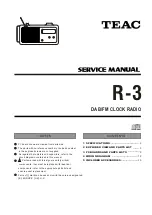
9
TK-880
■
Scan channel types
1) Priority channel is the most important channel for the
scan, and always detects a signal during scan and when
the scan stops temporarily.
2) Non-priority channels detects a signal during scan. For
the channels that can be selected with the group or chan-
nel up/down key when the scan does not occur, adds an
indicator “
▼
” lights.
■
Priority channel setting
A priority channel can be set as follows with the program-
ming software (KPG-60D).
1) Specify a priority channel as a fixed priority channel.
2) Make a selected channel, a priority channel.
■
Scan type according to the priority channel
1) When no priority channel is set : Only the non-priority
channels are scanned.
If a non-priority channel stops temporarily, it stops until
there is no signal on the channel.
2) When priority channel is set : Either priority channel is
scanned.
If a non-priority channel stops temporarily, a priority chan-
nel signal is detected at certain intervals.
If a priority channel stops temporarily, it stops until there
is no signal on the priority channel.
■
Revert channel
The revert channel is used to transmit during scanning
and set by the programming software (KPG-60D).
1) Priority
The transceiver reverts to the priority channel.
2) Priority with talkback
The transceiver reverts to the priority channel.
If you press PTT during a resume timer (dropout delay
time, TX dwell time) or calling, you can transmit on cur-
rent channel to answer to the call however revert channel
is set to priority channel.
After resume time, scan re-starts and transmission chan-
nel is return to priority channel.
3) Selected channel
The transceiver reverts to the channel before scanning or
the channel that you changed during scan.
4) Last called channel
The transceiver reverts to the last called channel during
the scan.
5) Last used channel
The transceiver reverts to the last used (transmitted)
channel during scan. “Last used” revert channel in-
cludes talkback function.
6) Selected with talkback
The transceiver reverts to the channel before scanning or
the channel that you changed during scan.
OPERATING FEATURES
■
Scan end
When you reactivate the key programmed to the scan
function during scan mode, the scan ends.
The scan icon “SCN” and scan text or revert channel
(programmable) display goes off.
■
Temporarily delete/add
It is possible to delete or add channel temporarily during
scan. When scan stops on unnecessary channel for ex-
ample by interference of the other party, activate the delete/
add function (for example press the key), then that channel
is deleted temporarily and scan re-start immediately.
When you would like to add the deleted channel tempo-
rarily to scan sequence, select the desired (deleted) channel
during scan, activate the delete/add function (for example
press the key) before scan re-start.
That channel is added temporarily to scan sequence. The
temporary deleted or added channels are returns to pre-set
delete/add, when the transceiver exits from scan mode.
■
Keypad operation
This parameter selects the default use of the numerical
field of the keypad. You can select from “DTMF”, “Selcall
entry”, “Status entry” and “OST”.
In the case of “OST”; Enter to use the keypad to recall
OST directly. To recall OST memory 1 to 9, press the OST
number directly for 1 second. To recall OST memory 10 to
16, press [
*
] for 1 second, then press [0] to [6].
Example; Recall OST memory 15 : [
*
] [5]
When OST memory is recalled by keypad [1] to [9], the
“OST” display lights and OST is turned on. If the keypad [#]
is pressed, OST is turned off, and the “OST” display goes
off.
■
Squelch logic signal
This signal is useful for external radio control units which
require a signal at the time of carrier operate relay or tone
operate relay.
■
TX sense
Select one of the following three output functions for
data communication.
• MIC PTT
Indicates the state of the microphone PTT.
MIC PTT on = Low, MIC PTT off = High
• Ext PTT
Indicates the state of the Acc PTT input.
Ext PTT on = Low, Ext PTT off = High
• TX line
Indicates the actual transmitter activity.
TX on = Low, TX off = High










































